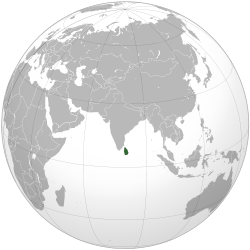Peacetime Priorities: A New Era For Sri Lanka’s Army – Interview
By Sergei DeSilva-Ranasinghe
Emerging victorious after defeating the LTTE more than three years ago, the Sri Lanka Army has since looked towards redefining its post-conflict role. As Sri Lanka’s first post-conflict commander, Lieutenant General Jagath Jayasuriya is presiding over the army’s peacetime reorganization, and in an exclusive interview spoke about the impact of peacetime duties on the Army, the threat posed by the remnants of the LTTE, efforts to share the lessons learnt from its military experience, and what the future holds for the Army.

Q: Tell us about the Army’s reorganization since the end of the conflict? Given the obvious differences between war and peacetime: how has the army readjusted to its new mission?
Gen Jayasuriya: The Sri Lanka Army since its establishment in 1949 has come a long way and earned the respect of the population as a reliable and professional organization which is secular and multi-ethnic. Since the successful culmination of military operations in May 2009 troops deployed in the north and east are positioned at strategic locations to provide security in a non-intrusive manner. The improved security situation presented the opportunity to redeploy troops into main bases. Up to 28 battalions that were in the north have been relocated to the south and the east of Sri Lanka. The overall number of troops in the north has also been reduced by over 21,000 since 2009.
The Army engaged in civil-military relations parallel to the Vanni operation. The scope of such activity extended to assisting the civil community and ministries in post conflict reconstruction, rehabilitation, reintegration and reconciliation. Similarly, the Army also stepped into the administrative vacuum upon cessation of the Vanni operation in 2009. It spearheaded the relief effort of the government and assisted in restoring civil administration in the north and east. Once civil administration was handed over to the proper authorities, the Army continued to provide technical support and manpower to assist the government in the nation-building process and post-conflict rehabilitation activities.
Q: Although the LTTE has been defeated can the group still present a security threat to Sri Lanka?
Gen Jayasuriya: Despite the military defeat of the LTTE and the elimination of its top leadership three years ago, the LTTE’s international organisation is still alive. There are ex-LTTE cadres, pro-LTTE activists and LTTE sympathizers still operating in many guises through various groups in numerous countries worldwide. The Transnational Government of Tamil Eelam (TGTE) has outlined the group’s clear intention to encourage resumption of direct struggles within Sri Lanka. In addition to the TGTE, there are various other LTTE-linked groups operating outside the country mainly in Europe with the aim of mustering support from the Tamil Diaspora for the division of Sri Lanka. Therefore it is quite evident that remnants of the LTTE are still trying hard to regenerate their cause. Recent anti-Sri Lanka agitation and violent protests in Tamil Nadu targeting innocent Sri Lankan pilgrims is proof that LTTE cells are active in southern India.
Q: What is the Army doing to preserve its wartime doctrinal concepts and what is being done to share its counterinsurgency experience?
Gen Jayasuriya: Sri Lanka Army is in the process of documenting the operational experience and is modernizing its military doctrine. The experience gained has been shared with foreign militaries since 2011 when the Sri Lanka Army held its inaugural international seminar under the theme: “Defeating Terrorism: The Sri Lankan Experience”. The Sri Lanka Army will continue to share its experience at this annual international forum. Training programmes related to counterinsurgency are held at Sri Lanka Army training establishments and are being offered to foreign militaries. Multinational exercises conducted in Sri Lanka will also be regular forums for sharing our experience.
Q: In the sphere of procurement and modernization what has the Army undertaken? Also, how do you see the army evolving over the next 10 years?
Gen Jayasuriya: The Army’s peacetime priorities are closely linked to national interests and security, and our peacetime recruitment policy is geared to meet general attrition of a peacetime military force. Contemporary peacetime priority of the Army is to transform into a technological and knowledge-based force capable of conducting full spectrum operations in a joint environment with an enhanced surveillance and intelligence capability. Elite forces will remain Sri Lanka’s strategic reserve. They will be trained and modernized to be capable of attaining their mission in the current and future security environment. They are currently at the right size and will remain so for the near future.
There have been significant additions to the Army’s inventory in fire-power, communications and surveillance assets during the Vanni operation. Future modernization will cater for enhanced C4I capability. The future operating environment will be driven by proliferation of WMD, cyber and space weapons, regional instability, violent extremism, transnational criminal activity and competition for resources. The diffusion of advanced technology in the global economy will enhance the effect of non-state actors. The Sri Lanka Army will evolve in keeping with its national policy and geo-strategic challenges.
Sergei DeSilva-Ranasinghe is a security analyst, defence writer and a Visiting Fellow at the National Security Institute, University of Canberra.
